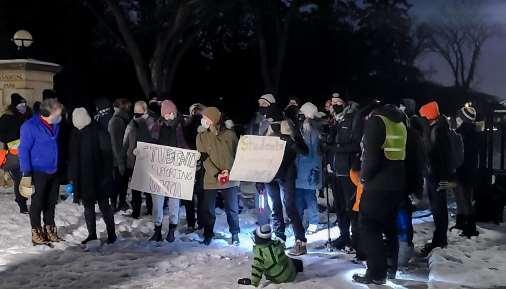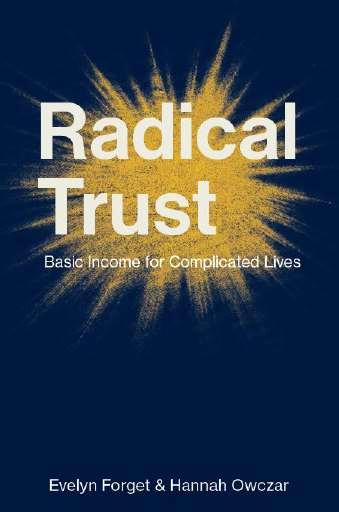
8 minute read
News pages 3 to
from 24 November 2021
NEWS
D , O T T .
UMFA members and supporters gathered at the Assiniboine Park gates on the corner of Corydon Avenue and Park Boulevard to protest the ongoing silence from Manitoba Premier Heather Stefanson.
Strikers and their families brought kitchenware, horns and other noisemakers to make their presence known as the march wound through the quiet suburb. After an hour, the march circled back to the park gates.
English, theater, fi lm and media professor Mark Libin was among the chief organizers of the march. Libin emphasized the lack of communication the union has had with premier.
“We’ve tried everything, we’ve sent her emails, we’ve reached out to her in all kinds of diff erent ways,” he said.
“Our pickets on the legislature have seen her many times and tried to talk to her about this. She ignores us, so we’re trying to get her to stop ignoring us.”
Brianna Kaldor-Mair, an undergraduate biology student at the U of M, joined the march to support UMFA’s eff orts.
“I was here for the strike, too. I’m a relatively senior student and I wanted to show support for my professors,” she said.
“I do not agree with the provincial government interfering with negotiations with unions and I think that my professors deserve a better deal than they’re currently getting.”
Despite her frustration with the frequency of strikes at the U of M, Kaldor-Mair hopes labour relations will improve as a result.
“I think the fact that there’s been two strikes in my undergrad degree is a really good indication of the state of confl ict between the admin and the professors and, let me make it very clear, I do think the admin is in the wrong in this confl ict,” she said.
“But I’d like to see things improve and I hope that things do improve from this. I hope that this is a wake-up call.”
However, the march was not without controversy. The promotional material for the march was widely criticized for parallels between it and imagery associated with the ongoing crisis of missing and murdered Indigenous women, girls and twospirit people. The event was initially called a “Heather Stefanson search
sta ff
party” and the poster featured a red background with black block text, a picture of a bass drum and a small picture of Stefanson with the word “missing” overtop.
UMFA changed the poster in response to the criticism. The revised poster changed the background colour, inverted Stefanson’s picture and replaced the word “missing” with “hello???” The wording on the poster, including calling the event a search party, remained unchanged.
On the day of the march, UMFA issued a further-revised poster which instead featured an image evocative of Carmen Sandiego and the phrase “Where in the world is Premier Heather Stefanson.”
Union president Orvie Dingwall issued an apology to CBC that evening regarding the promotion of the event. The apology acknowledged the community response and promised changes to its internal processes.
— Brianna Kaldor-Mair U of M student
NEWS
Unvaccinated students to be excluded from in-person classes

Students that remain unvaccinated will be unable to register for in-person classes for winter semester.
At the Nov. UMSU board of directors meeting, UMSU vice-chair of the judicial committee Jaron Rykiss raised the question, prompting UMSU president Brendan Scott to state that “as of right now, [winter semester is one] hundred per cent planned to be in person,” but clarifi ed that he expects all classes that are currently online will remain so and speculated that there will be more online off erings than in recent years.
ACC students welcomed to provincial advocacy group
At the meeting, UMSU president Brendan Scott announced the Manitoba Alliance of Post-Secondary Students (MAPSS) has accepted Assiniboine Community College Students’ Association as a member.
MAPSS came into being in as a coalition between UMSU, the University of Manitoba Graduate Students’ Association and the Red River College Students’ Association. On its website, it claims to represent over , students in Manitoba.
In April, the organization lobbied Minister of Advanced Education, Skills and Immigration Wayne Ewasko to amend the controversial Bill to exclude the fees set by student unions and associations from regulation by the minister.
The bill received royal assent on May .
Changes to board structure delayed
Changes to be made to the structure of the UMSU board of directors, which have been in the works since at least March , have been delayed by approximately two weeks.
One of the major changes, which abolished the slate system for UMSU elections, was fi nalized earlier this year.
graphic / Dallin Chicoine / staff
the removal of voting rights from all current board members — including community representatives and executives — replacing it with a smaller board to be elected independently.
Currently the board of directors consists of voting members, although there are vacant positions. According to UMSU president Brendan Scott, the new board will feature members.
Motions regarding the change are expected to be introduced on Dec. and voted on in January.
RESEARCH & TECHNOLOGY
E F , U M , H O , , R T : B I C L . Forget has been studying basic income as a health economist in the Rady faculty of health sciences for more than two decades.
Radical Trust launched at McNally Robinson on Nov. . The authors argue existing social programs fall short in providing an adequate baseline for all people.
Forget points to the Canada child benefi t, aimed at children, and the guaranteed income supplement and old age security, aimed toward older adults.
“The great gap in system is for to -year-olds, working-age adults,” Forget said.
Radical Trust addresses the preconceived notion that if you are a working-age adult and living in poverty, it must be your own fault. Forget drew from her previous research in basic income and Owczar’s experience in journalism to produce a compelling case for basic income as a tool to address poverty in Canada. In the course of writing the book, the authors found the contributing factors of poverty are deeply interconnected. “In our minds, we had this book set out into tidy little chapters,” Forget said.
“‘We’re going to write this chapter about kids who are aging out of the foster care system.’ Well, you start writing about that and the next thing you’re into substance use and you’re into homelessness […] you’re into violent relationships.
“You’re into all kinds of things because none of them are separate.”
Forget has been researching basic income since the Mincome project in the s, when she was an undergraduate student. The Mincome experiments took place in Winnipeg and Dauphin. As Forget explains, in Winnipeg the project was run as a randomized control trial with separate control and treatment groups. The minimum income was also off set by traditionally earned income. While no offi cial report was published on the study, economists at the U of M published their own analyses.
The experiment sought to determine if a guaranteed income would result in more or less paid work.
“There were two groups who did work less,” Forget said. “New mothers and […] young, unattached males.”
An article Forget published in suggests that new mothers used the guaranteed income to “buy” themselves a longer maternity leave. Interviews with young, unattached males suggest that they pursued education, rather than employment, when off ered a guaranteed income. Forget also found that high school graduation rates surpassed per cent, as previous dropouts returned to complete their diploma.
One of the starkest fi ndings was that hospitalizations fell . per cent in the Dauphin treatment group.
“You don’t have to spend a lot of time walking around that hospital to realize that a lot of our health care is going to support the consequences of poverty,” Forget said.
“When you’re a health economist, you’re always focused on costs […] and you realize you’re spending so much money to deal with people when they’re in the state of crisis. It’s hard not to think about whether you could be investing a little bit of money upstream and preventing some of these issues from occurring in the fi rst place.”
Forget and Owczar became connected through Basic Income Manitoba. Owczar worked at Basic Income Manitoba as a communications specialist and Forget was on the board of directors. Forget hired Owczar to conduct interviews and help tell the stories of people aff ected by poverty for a basic income book project she was working on at the time.
“We put people with lived experience of poverty at the forefront of each chapter,” Owczar said.
“We felt that they were the experts in the realm and they could really tell us how the system was or was not working for them.”
Some people interviewed for the book had successfully transitioned out of poverty and wanted to provide their insight into how social systems have worked for them.
“What they needed was money to be able to spend in their own way to address their own needs — and that’s something that our social assistance programs have largely failed to do,” Owczar said.
The title of the book refers to the radical trust one must place in people to allow them to decide for themselves how to best live their lives.
“I hope that in reading these stories, people can have a better sense of empathy for folks,” Owczar said.
— Hannah Owczar writer and communications specialist in the department of community health sciences







